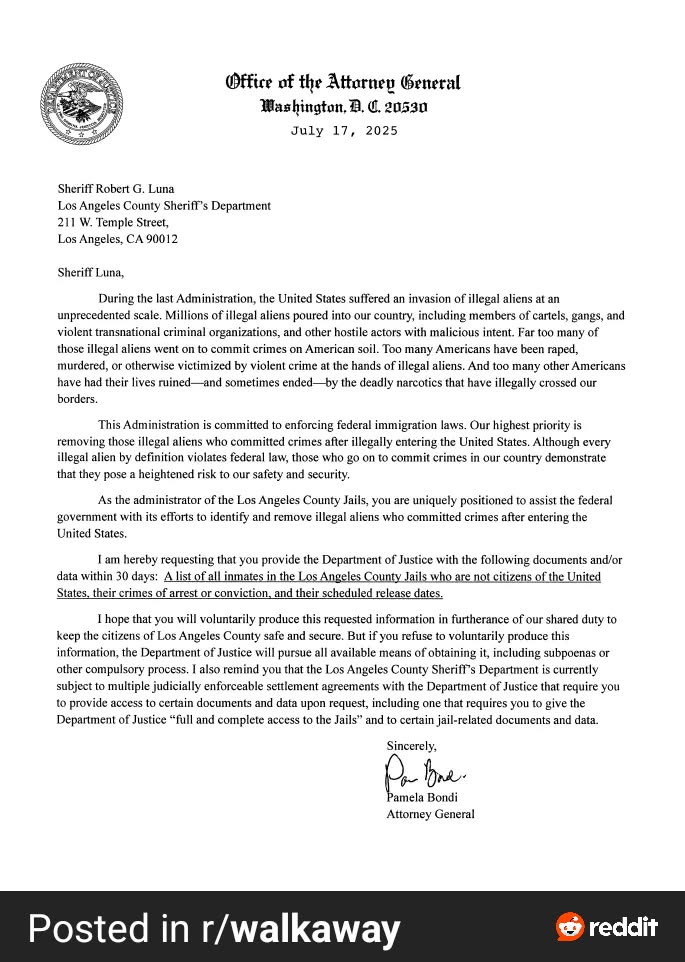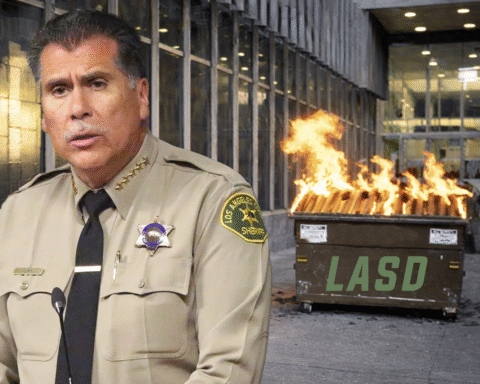EDITOR’S NOTE:
Within hours of releasing this article, a stunning new move by the Department of Justice made national headlines. Attorney General Pam Bondi delivered a scorching demand letter to Sheriff Robert Luna, ordering the Los Angeles County Sheriff’s Department to hand over a full list of non-citizen inmates, including their arrest records and release dates, within 30 days. The letter, dated July 17, 2025, accuses LA County of harboring dangerous criminals under the guise of sanctuary protections and makes it crystal clear: this administration is done playing nice with jurisdictions that defy federal immigration law. Bondi’s move follows President Trump’s executive directive to crack down on sanctuary policies in California, sending a strong message that the DOJ is prepared to use subpoenas—and even federal lawsuits—to force compliance. For LA’s political class, who’ve spent years selling sanctuary optics while hiding behind legal loopholes, the era of unchecked hypocrisy may finally be over.
The hypocrisy couldn’t be more glaring. For over a decade, LA County willingly handed over detailed inmate data to the feds, netting $122 million through the SCAAP program by flagging undocumented inmates for deportation. Now, after rebranding as champions of immigrant rights, county leaders find themselves in the crosshairs of a Trump administration no longer willing to tolerate sanctuary grandstanding.
Bondi’s letter also exposes the County’s whiplash-inducing pivot from data-sharing profiteers to defiant obstructionists. The same system that once sold ICE a pipeline of jailhouse information is now refusing to cooperate, until federal subpoenas show up at the front door.

In 2017, Los Angeles County’s Board of Supervisors had no qualms about profiting from immigrant incarceration. They backed then-Sheriff Jim McDonnell and his partnership with Immigration and Customs Enforcement (ICE), openly supporting federal immigration enforcement inside LA County jails. The county was deeply entrenched in a multi-million-dollar funding pipeline: the State Criminal Alien Assistance Program (SCAAP) poured in federal dollars, $122 million between 2003 and 2018, in exchange for detailed data on undocumented inmates.

The very same Supervisors who now portray themselves as fierce protectors of immigrant rights once quietly enabled, funded, and institutionalized cooperation with ICE. County jails became a central node in federal immigration enforcement. ICE agents were given direct access to jail facilities and inmate databases. The Board not only authorized it, they cashed in on it.
Official documents from the LA County Sheriff’s Department confirm the $122 million figure, showing clear participation in SCAAP by providing inmate data to the federal government. A 2019 Civilian Oversight Commission report even recommended the county explore continued federal reimbursement tied to ICE detainers. The relationship was also formalized in Board-approved Memoranda of Understanding, which included information-sharing agreements designed to keep the ICE pipeline flowing. These were not vague policies, they were contractual, public, and deliberate.
Then came the 2018 sheriff’s election. Alex Villanueva, a retired LASD Lieutenant and political outsider, defeated the incumbent McDonnell in a stunning upset. Running as a Democrat, Villanueva immediately implemented sweeping changes that disrupted years of ICE cooperation. He banned civil immigration transfers without a judicial warrant, removed ICE’s physical presence from county jails, and cut ties with SCAAP, rejecting the notion that LA County should profit from turning undocumented individuals over to federal authorities. He called it what it was, “blood money.”

It was a bold move that drew both praise and criticism. Then, as the political tide shifted nationally in the wake of the George Floyd protests and the rise of the BLM and Defund the Police movements, the same Board of Supervisors who had quietly supported ICE access began publicly positioning themselves as champions of immigrant rights. It was a dramatic, and politically convenient, reversal.
Villanueva was the catalyst that forced LA County’s political class to stop profiting from ICE cooperation. He dismantled the infrastructure that the Board of Supervisors had quietly upheld for over a decade. His actions triggered a fundamental shift in how immigration enforcement was handled in the Los Angeles County jail system.
Today, the Board of Supervisors continues to posture as if they’ve always stood with immigrant communities—but their shift wasn’t driven by conviction. It was dictated by the shifting political winds. No amount of press releases or rebranding can erase the record: they profited from ICE one year, then condemned it the next. And they did it not out of moral clarity, but to stay politically afloat.
Meanwhile, the national landscape around immigration enforcement has undergone a seismic shift. President Joe Biden’s open-border policies have overwhelmed law enforcement agencies across the country, forcing them to recalibrate their stance on ICE. The influx of migrants at the southern border, combined with strained local resources, has reignited calls for stronger coordination between local, state, and federal agencies—including ICE. What was once a polarizing political flashpoint is now a practical necessity for many jurisdictions struggling to maintain order and provide services amid record-breaking border crossings.
This new reality has become a game changer. It has exposed the cost of performative sanctuary politics and left local governments scrambling to reconcile public safety needs with their ideological commitments. Even in California—long considered a sanctuary stronghold—communities are beginning to question whether distancing from federal immigration enforcement has come at too high a price.
For law enforcement professionals, the situation is clear: ideology can’t secure the border, and slogans don’t stop traffickers, smugglers, or repeat offenders. As a result, agencies across the country are being forced to reassess their relationship with ICE—not as a political tool, but as a necessary partner in maintaining public safety.
While Villanueva once led the charge to sever ties with ICE, he’s now advocating for a more balanced, law-and-order approach. After changing his party affiliation to Republican this year, Villanueva has been vocal about the need for pragmatic immigration enforcement that protects both immigrant communities and the broader public. His evolution reflects a growing sentiment among law enforcement leaders nationwide: cooperation with ICE isn’t about politics, it’s about safety, resources, and responsibility.
History will remember who stood on principle, and who pivoted the moment it became politically convenient. And in this case, the receipts speak louder than the carefully scripted narratives now being pushed by mainstream media to prop up a crumbling progressive agenda.





Follow Us